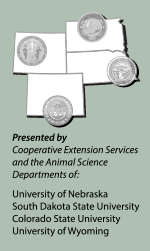Policy Issues Affect Beef Industry
Policy analyst highlights three major factors affecting the beef industry.
by Kasey Brown, associate editor
RAPID CITY, S.D. (Dec. 3, 2013) — Not many people are happy with lawmakers in Washington, but the fact of the matter is that there are several issues that affect the beef industry, Roger Bernard, policy analyst for Informa Economics, told the more than 500 attendees of the Range Beef Cow Symposium Dec. 3-5, 2013, in Rapid City, S.D. Unfortunately, many of those issues are in limbo as lawmakers have kicked them down the road, he said.

Policy analyst Roger Bernard addressed three major factors affecting the beef industry — the Farm Bill, COOL and biofuels.
The 113th Congress has, historically, enacted the least amount of laws. The Farm Bill has taken three years to get to its current stage. It is closer to the finish line, he said, because both chambers have passed their versions of the bill and the House-Senate conference process is occurring. He said the headline issues include crops, dairy and nutrition programs, but there are still implications for the beef industry.
The Livestock Disaster program is reauthorized in both House and Senate versions of the Farm Bill, and would provide coverage retroactively to 2012, he noted. The Livestock Indemnity Program would be tweaked. The House version provides payments at 75% of the market value and the Senate version provides payments at 65% of the market value of livestock. Additionally, under the Senate bill, $50 million per year from fiscal year 2014 to 2018 would be awarded for research.
Country-of-origin labeling (COOL) was enacted May 23, and the World Trade Organization (WTO) is still examining whether it meets the United States’ WTO obligations. Bernard said the same officials who made the initial determination have been requested to do the examination. This expedites the process, and a conclusion is expected in February 2014. He said Canada has a list of products for which they will seek retaliation if the United States does not change COOL. This list could reach $1 billion annually if the WTO rules against the United States. He said Mexico also has a list, but it has not been published.
Biofuels policy also affects the beef cattle industry and has been a source of contention. While more rain in 2013 has eased some of the feed costs due to more production, biofuel mandates called for adjustment. He explained that the corn ethanol mandate for 2013 is 13.8 billion gallons, for 2014 is 14.4 billion gallons, and for 2015 is 15 billion gallons. The biodiesel mandate for 2012 was 1 billion gallons, for 2013 is 1.28 billion gallons, and 2014 is 1.7 billion gallons.
For 2013, the Environmental Protection Agency (EPA) altered the volume requirements for cellulosic ethanol because it has not become a major component of the U.S. biofuels production. He added that the EPA extended the compliance period for 2013 for four months beyond the normal timeline. The EPA also said in its 2013 final plans for the Renewable Fuels Standard (RFS) that mandates for 2014 would likely be reduced. Any legislation on the RFS, biofuels or other matters on renewable fuels will depend upon legislators’ reaction to the EPA’s proposals for 2014.
Bernard spoke Tuesday at RBCS XXIII. Visit the Newsroom at www.rangebeefcow.com/2013 view his PowerPoint, read his proceedings paper or listen to his presentation.
---------------------
The RBCS is a biennial educational symposium offering practical production management information. It is sponsored by the Cooperative Extension Service and animal science departments of the University of Wyoming, South Dakota State University, Colorado State University and the University of Nebraska.
Comprehensive coverage of the symposium is available online at www.rangebeefcow.com. Compiled by the Angus Journal editorial team, the site is made possible through sponsorship of LiveAuctions.tv and the cooperation of the host committee.
Editor’s Note: This article was written under contract or by staff of the Angus Journal. To request reprint permission and guidelines, contact Shauna Rose Hermel, editor, at 816-383-5270.


